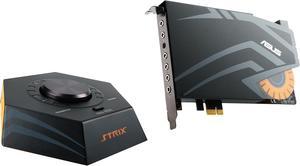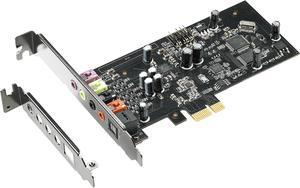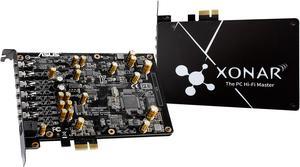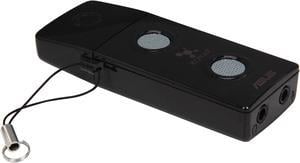
- Audio Chipset: C-Media USB2.0 6632AX High-Definition Sound Processor (Max. 384KHz / 24bit)
- Sample Rate: 44.1K / 48K / 88.2K / 96K / 176.4K / 192KHz
- SNR: Output Signal-to-Noise Ratio (A-Weighted) (Front-out) : 116dB Output Signal-to-Noise Ratio (A-Weighted) (Headphone-out) : 110dB Input Signal-to-Noise Ratio (A-Weighted) : 110dB
- Line In: 1 x 3.5 mm jack (1/8") (Line-in/ Mic-in combo)
- Model #: 90YB00I0-M0UA00
- $129.99 –
- Special Shipping

- Audio Chipset: C-Media
- Sample Rate: 192KHz
- Digital Audio: 24-bit
- SNR: 116dB
- Model #: 90YA00T0-M0UA00
- $108.99 –
- Free Shipping

- Audio Chipset: C-Media
- Sample Rate: 192KHz
- Digital Audio: 24-bit
- SNR: Output Signal-to-Noise Ratio (A-Weighted) (Front-out): 110dB Output Signal-to-Noise Ratio (A-Weighted) (Headphone-out): 108dB Input Signal-to-Noise Ratio (A-Weighted): 103dB
- Model #: 90YA00P0-M0UA00
- $127.99 –
- Free Shipping

- Audio Chipset: ASUS UA100
- Sample Rate: 48KHz
- Digital Audio: 16-bit
- SNR: 100dB
- Model #: XONAR_U3/UAD/B/A
- $29.99 –
- Special Shipping
ASUS sound cards are available as internal and external sound cards to cater to desktop computers and laptops alike. Desktop computers, depending on the size of the motherboard, have additional slots available for internal sound cards. You may upgrade or replace a sound card in a laptop more efficiently with an external sound card than an internal one. Certain sound cards cater to standard 5.1 or 7.1 surround sound, while some options allow for a stereo or headphone connection. If you need to reduce latency, the sample rate is an important consideration. For gamers, sound engineers and video editors, low latency is a must. Whether you need to enhance the audio for gaming, sound engineering, video editing, or entertainment in general, you can find a suitable PC sound card.
Higher Sample Rates Reduce Latency
The internal sound cards come in PCI, which works well with older computers or PCI Express x1, which caters to newer computers. The external PC sound cards have USB connections. In addition to the inputs and outputs, there is also the option of including a CD ROM. Decibel (dB) outputs range from 100 dB to 124 dB. While latency is also caused by a slow computer, sound cards with higher sample rates help with this problem. Cards with a sample rate of up to 192 kHz are available. Choose between digital audio options of 16-bit or for High Definition (HD), a 24-bit card.
External Sound Cards are Easy to Install
External sound cards take the hassle out of installation. Unlike with internal sound cards, there is no need to open up the computer case to install it. External cards plugin via USB. For both laptops and desktop computers, this is a convenient way to give the audio quality an upgrade or replace a broken built-in sound card. External Asus sound cards are portable, and you can use them with a variety of sound card accessories such as amplifiers and audio decoders. The size of the sound card depends on the number of inputs and outputs. For example, basic sound cards are reasonably small connect to speakers or headphones. In the case of longer cables versus simply slotting the card in as you would a memory stick, there may be some latency. Prevent latency by choosing a high-speed USB or FireWire Interface option.
Enhance Your Audio Experience with Accessories
To get sound from computers, you need a combination of headsets or speakers, and sound cards. Along with a good headset, gaming sound cards ensure that environmental sounds and communication with teammates are at their best. Asus Xonar sound cards stand out as suitable options for gaming computers. Musicians and sound engineers will benefit from using an audio interface, which is a sound card with instrument and microphone connections and provides a portable recording unit. Some options include an amplifier that works with either headphones, speakers or both for when you need the volume higher.
